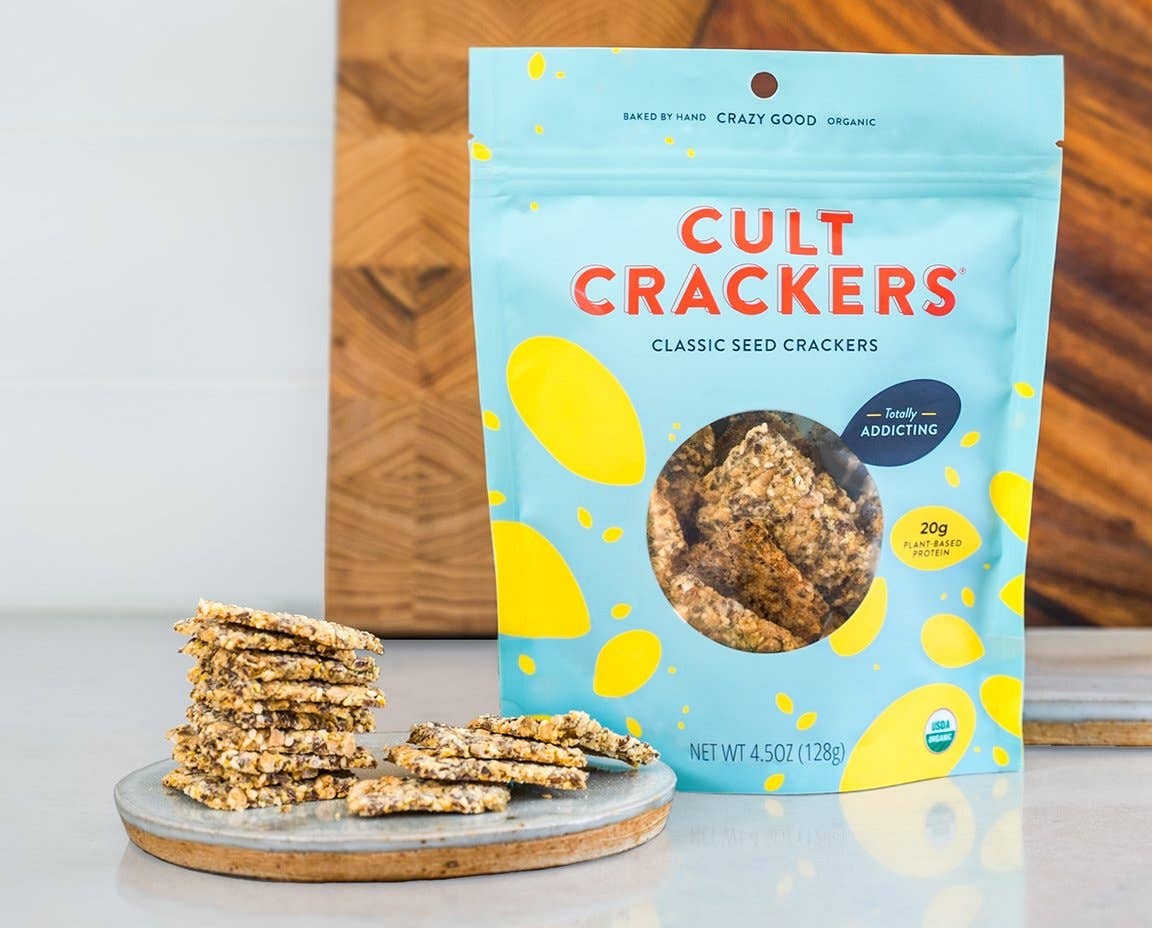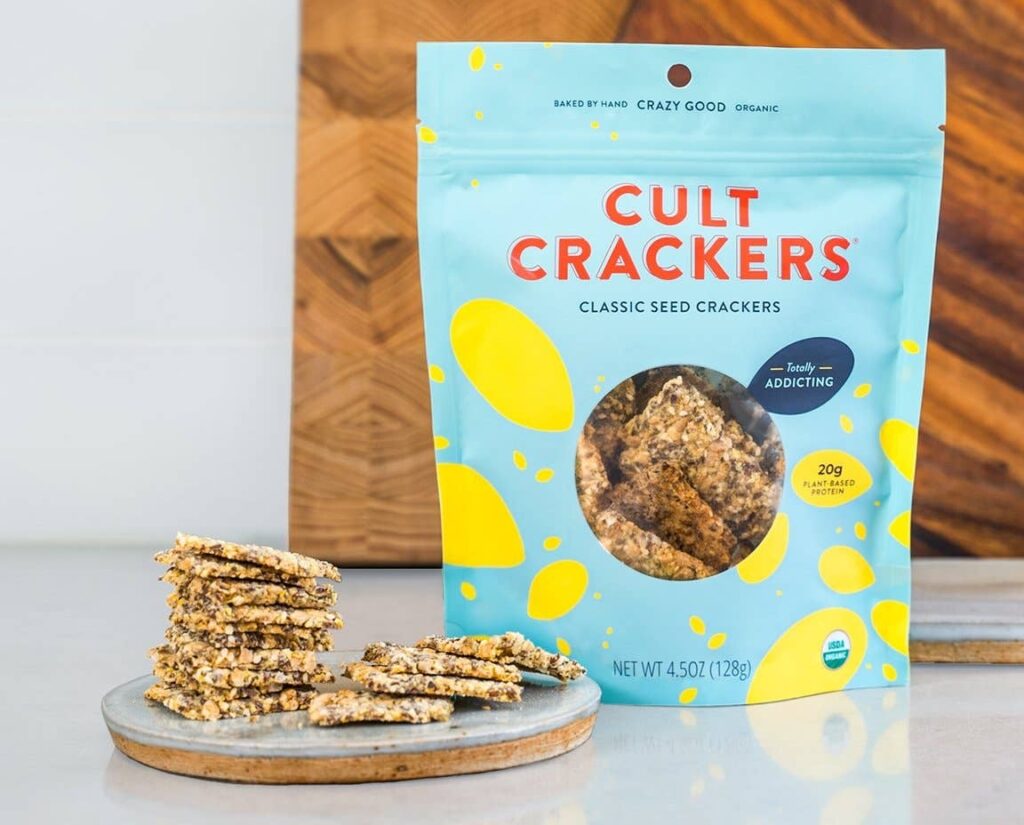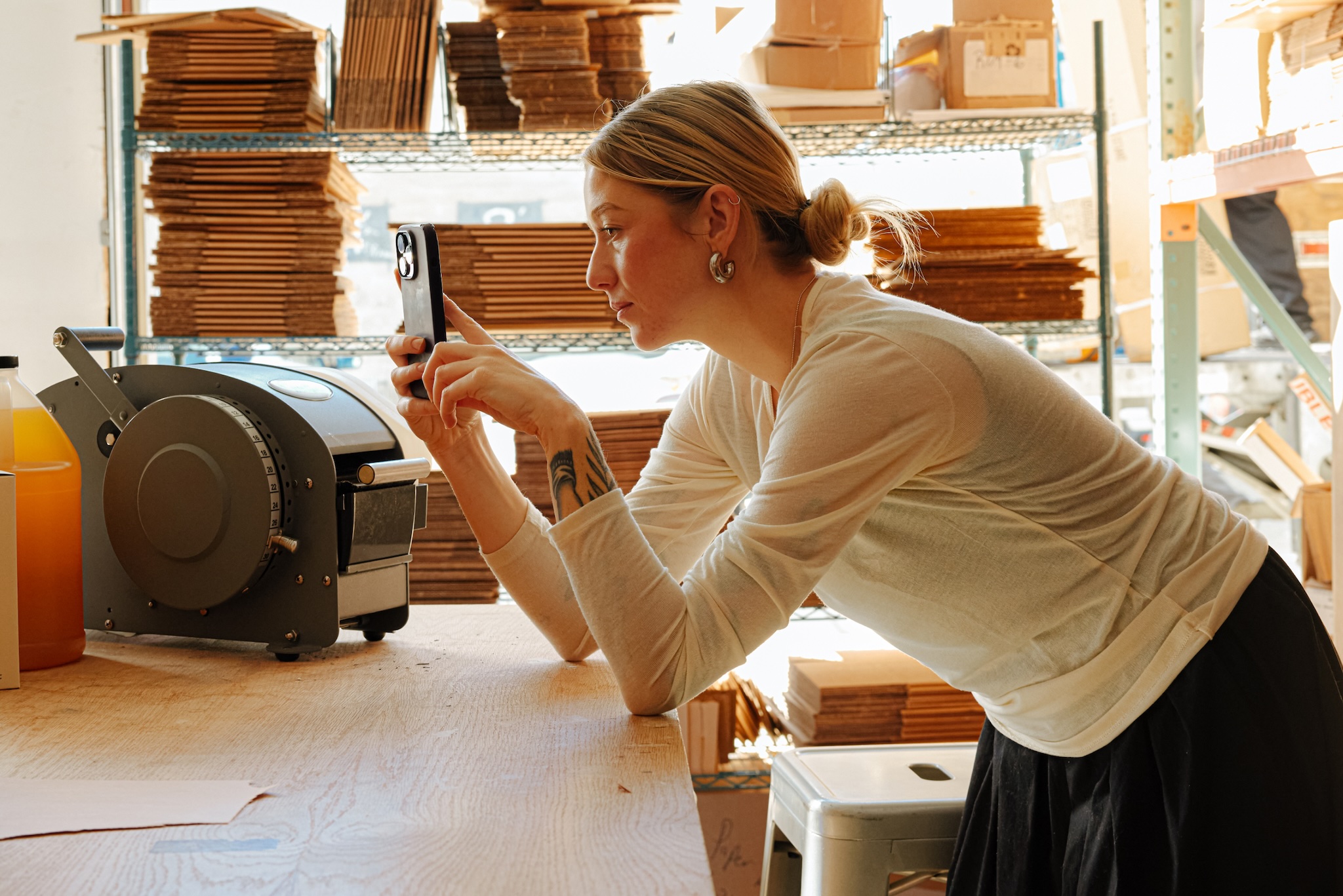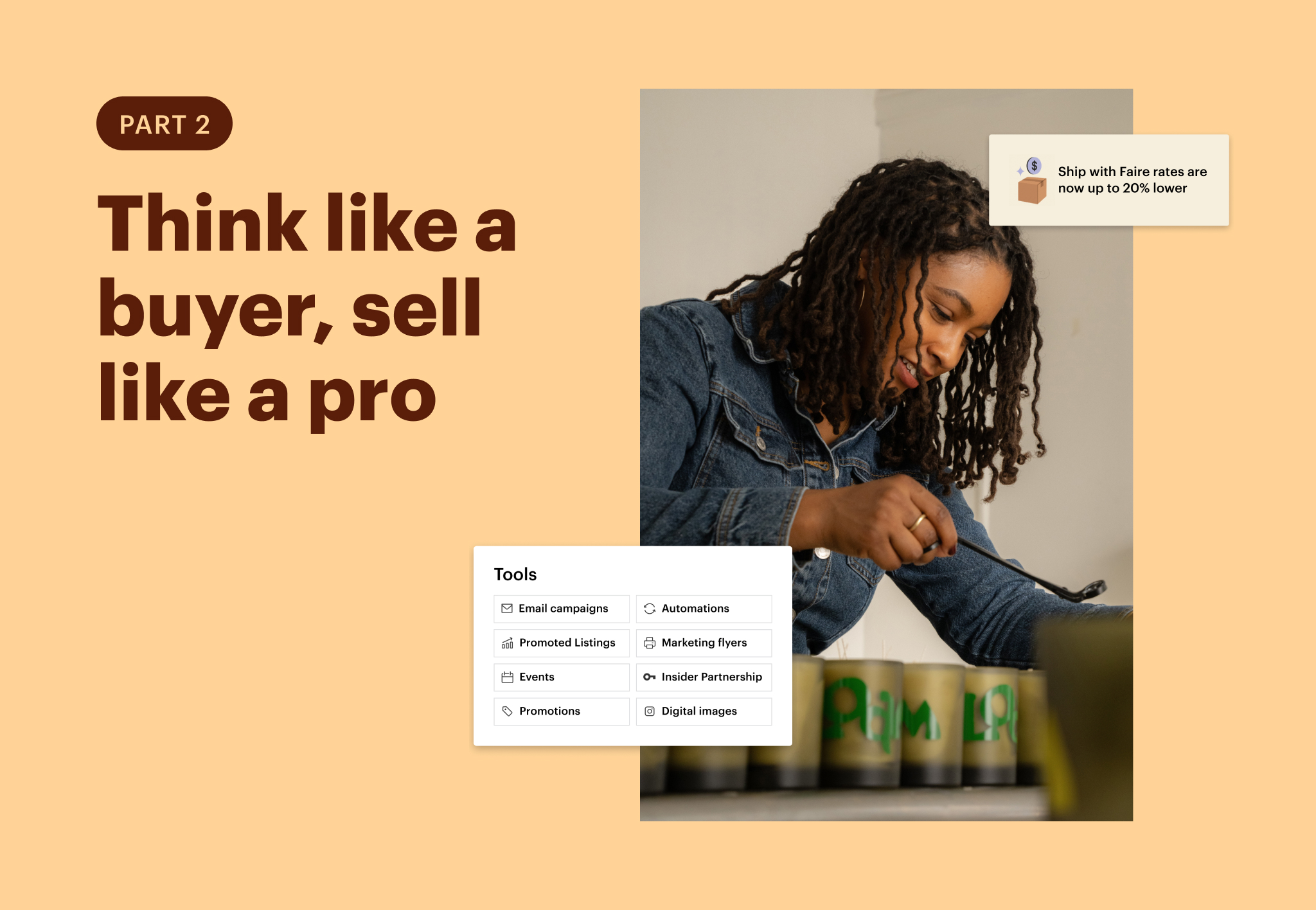
Highlights
- Follow state laws and regulations, keep workspaces sanitized, and know your suppliers.
- Rent a shared commercial kitchen to save money on equipment and grow your community.
- Set your product apart with an engaging brand identity and story.

Whether you’ve perfected your grandmother’s cookie recipe and want to share it with the masses or have started jarring your own jam, launching your own food business is challenging. The process includes all the typical hurdles of starting your own business in any other industry—from navigating funding to developing a marketing plan—with the added intricacies of expiration dates and food safety.
But with some guidance, getting those beloved family recipes, tasty snacks, and sweet gifts on store shelves is within your reach. To get an inside look at the process of starting and running a successful food business, we sat down with Cult Crackers founder Dianna Dar, whose organic snacks have taken off on Faire. (They’ve also been featured in Good Housekeeping and Architectural Digest.)
Read on for how to turn your passion for food into a profitable endeavor, including laws to follow and permits you may need, how to ensure consistency in your supply chain, ways to build your brand, and plenty of other tips from Dianna along the way.
Learn the rules … and follow them
When it comes to selling food online, it’s critical that you follow the rules. Making sure you’re in compliance with the laws and that you have all the permits and licensing required will help you avoid costs and fees down the line. The last thing you want is to finally get your company up and running only to get shut down by the health inspector … or make someone sick.
Get to know the FDA
Food sales are regulated on a local and federal level. On the federal level, you have the Food and Drug Administration (FDA). It’s in charge of making sure food products are labeled correctly—for example, if something is labeled certified organic, the FDA ensures that it is actually organic—and if and how food is sold across state lines.
Know your state laws too
Through the FDA website, you can also look up your state laws and regulations. You’ll see if your business needs to be licensed or inspected each year or if you need permits (for the sale of certain types of foods, like meat and fish). You may also need a food handler’s license or to meet certain sanitary standards. Look especially closely at the guidelines if you’re selling cannabis-infused goods and alcohol, as those regulations vary widely from state to state and have evolved over the years.
You should also pay attention to your state’s Cottage Food Laws, which allow for some regulatory wiggle room when it comes to making certain foods at home, as opposed to commercial kitchens.
Not sure what to do? Ask for help!
If you find these websites confusing or you’re not sure if you’re following the rules correctly, it can always help to call a lawyer or your local health inspector. It may take time up front, but it’ll save you time in the long run—and protect your reputation.
We suggest getting ahead of the game by having regular food-handling training sessions for yourself and any staff and scheduling your own kitchen inspections so that you can be fully confident that your workspace is, well, clean enough to eat off of. And if you’re working with suppliers, make sure they’re just as rigorous. You’re only as clean as your most sanitized work surface.
Protect yourself just in case
Mistakes happen. That’s why you may want to look into liability insurance. This should help your business in case an inspection goes badly or if a customer gets sick.
Ready to get started? You can apply for your state business license here.
Kitchen considerations
Next, you’ll need to think about where you’ll be producing your food. Here are some options:
At home: There are lots of benefits to making your products at home—it’s convenient and inexpensive, of course, and you have full control over the production process. That being said, you may run into scaling issues as your business starts to grow. For example, a home oven can bake only so many snacks and a dining room table can hold only so many bags and boxes for packaging.
A commercial kitchen: Renting out a full commercial kitchen will give you the flexibility to build a space that meets your requirements, from the types of tools you need to layout and lighting. While this may seem like a dream scenario, it may not be the best bet for a brand-new company, since it’s the most expensive option for a budding business, and you’ll need to make sure that the facility is licensed correctly.
A shared co-op kitchen space: Renting a shared commercial space can be the best of both worlds. You’ll get access to bigger machinery so you can cook and bake in bulk at a fraction of the cost of setting up a kitchen all on your own. Plus, the space should already be up to code and licensed. Generally, these spaces are available for rent by the hour or month.
In Cult Crackers’ first year, Dianna shared a space with another food brand. She says, “If it’s possible for brands when you’re just starting out, share a space, share resources, do anything you can to be more frugal.”
An added benefit? Sharing a kitchen space may just help you meet other like-minded small business owners who can teach you a thing or two about the industry or introduce you to suppliers that share your values. You might connect with other food brands for marketing partnerships or just enjoy being part of a food community.
Source your ingredients
Just like with any business, whether you’re selling clothes or jewelry or furniture, you want to make savvy choices about your supply chain. Ultimately, knowing where your raw materials come from can maintain your brand integrity and help you keep your promises to your customers.
For example, you may want to source your ingredients from a certain farm where you know workers are paid living wages and that its team’s values align with yours. Or you may want to choose a transportation company that has stringent sanitation practices to ensure that your ingredients come to you as fresh as possible.
At the beginning of your food business journey, you may start by shopping at big-box chains, but it ultimately may become easier or cheaper to work with small-batch farmers or wholesale makers. Either way, always be sure you know their practices and their priorities, so you can have as much control over the creation process as possible.
Build your brand
Building your brand identity can take time, but here are three tips for starting out on the right foot.
Get introspective
Building your brand is all about knowing who you are, what your values are, and communicating your brand story. So before you get to marketing or designing, ask yourself: What’s my vision and mission? What’s my story? Think about what you want to share with the world … and why. These answers will help you figure out what makes your brand unique. Find a more in-depth guide here, and read this article to help you pick out the perfect name for your company.
Find your audience
Once you’ve defined your values and your brand narrative, Dianna’s advice for new businesses is to “look to similar brands. Let’s say you’re making an olive oil that’s in a squeeze bottle. Find brands like it. See what stores they’re in. Learn about their customer base and go after them. Always keep an eye on what else is out there.” By getting to know the market, you’ll get a stronger sense of what niche your product could fill. Does your target customer shop at specialty markets? Local bodegas?
Tell your story
While looking at competitors is helpful, you’ll also want to think about how you want your brand to differ from other products on the shelves, whether that’s with your packaging, your ingredients, or simply the stores you’re selling in.
When it comes to packaging, Dianna says, “Our designer did a fantastic job with our packaging. Initially, we had a very crafty-looking label with a folk design on it. It was lovely and beautiful, but it got lost on the shelf. I wanted something really bold and colorful, and ultimately we got there.”
For increased visibility, think about partnerships with local makers and small businesses or potential sponsorships with influencers. Launching a Faire shop is another good place to start.
Create a website
When you have a brick-and-mortar shop, it can be much easier to entice customers to try your food. Tasty little samples, the delightful smell of cookies baking, giftables at the front of the shop. Online, you need to work harder to get people interested.
To sell food online, you need an informative website that’s easy to navigate, with a seamless shopping experience. Your About page is a great opportunity to share your mission with potential customers and explain what makes your products special.
Be sure that every product listed on your website has a clear photo with details about ingredients, allergens, and a description of exciting flavors (or even flavor pairings!).
For more information about making a great website, this guide to e-commerce merchandising is a good place to start.
Meet potential buyers
Beyond your own online shop, you’ll also want to forge relationships with physical stores so they’ll stock your products. You never know what advice or opportunities might crop up!
“It doesn’t have to be a big account,” says Dianna. “Just a known entity, so that grocery store buyers might come looking to see what’s new and trending. And then you’ll have people coming to you, which is nice,” she says. She started out by selling her crackers at a small cheese shop in Berkeley. You might begin by partnering with local pop-ups or with a farmers market stall, depending on what makes the most sense for your audience. Don’t forget about the power of word of mouth! Have your friends and family spread the word—you never know who might encounter an interested buyer.
Final tips from Dianna
As Dianna’s Cult Crackers take off, she has a few more best practices for those who are just starting out.
- “Stay frugal and stay focused. Know who your customer is, know what your brand is, and know what your goals are.”
- “In the beginning, you want to say yes to everything, but it’s OK to say no. Don’t overextend yourself.”
- “When it comes to hiring, hire someone you trust, who gets you, and who will listen to you. Ask yourself what you do best. What don’t you like doing? What’s a challenge for you? And what could somebody else be doing instead of you?”
The key to her success: Dreaming big but not rushing. She takes the time to think through every step of the process from mixing to manufacturing so that Cult Crackers gets more efficient as time goes on. While you plan your own food business, remember that every step forward is progress, so be sure to celebrate the little wins along the way.




